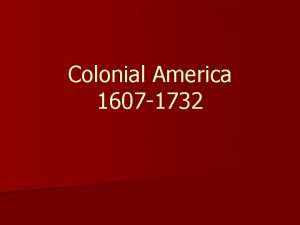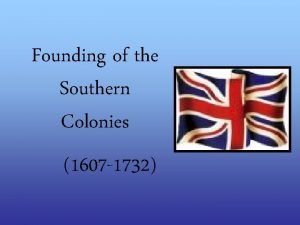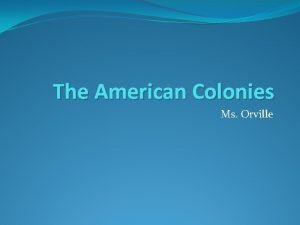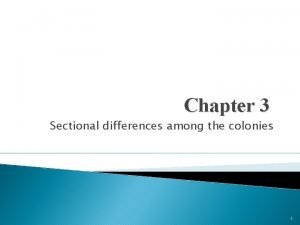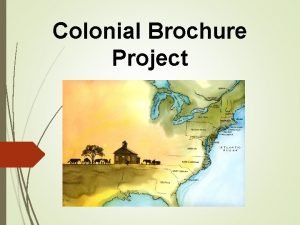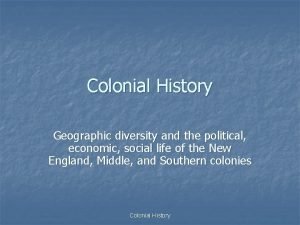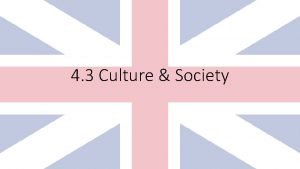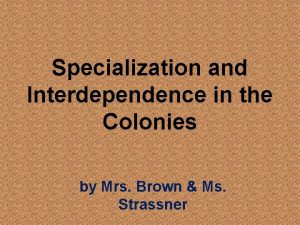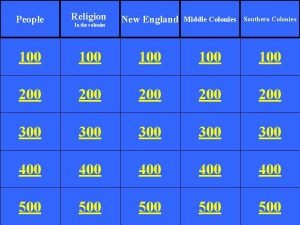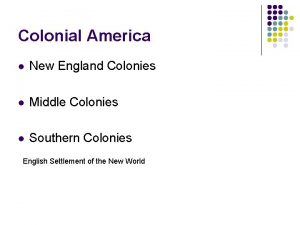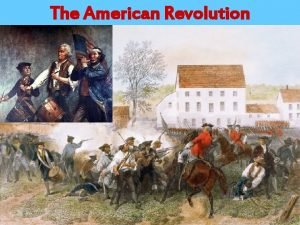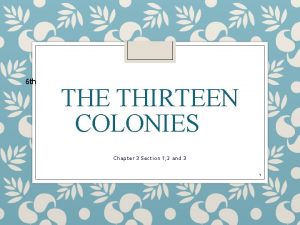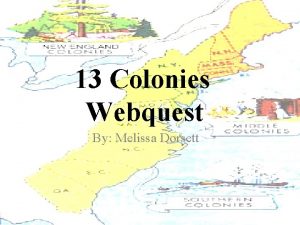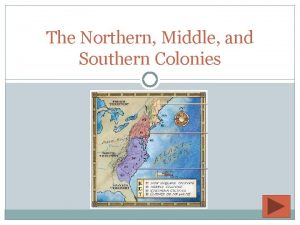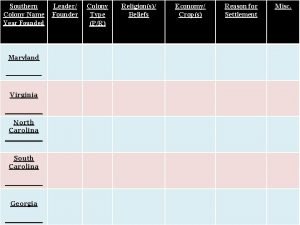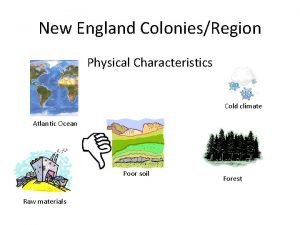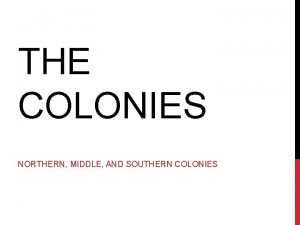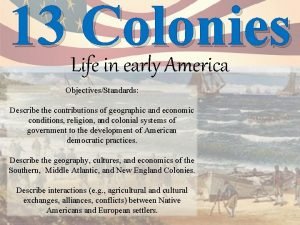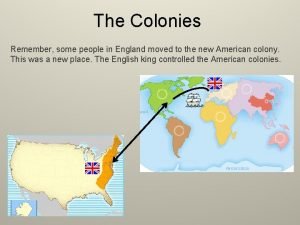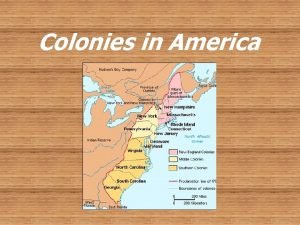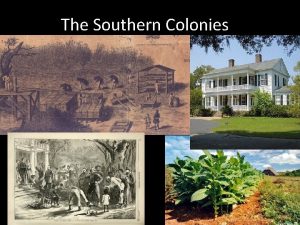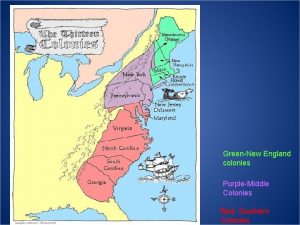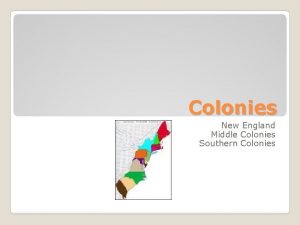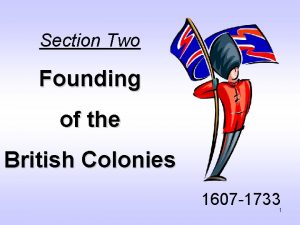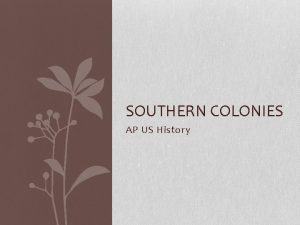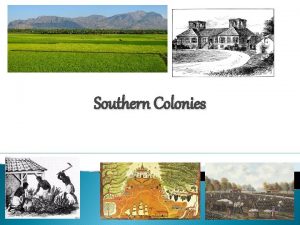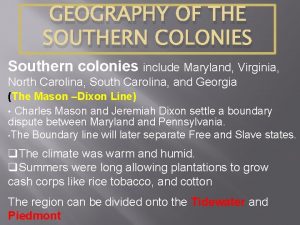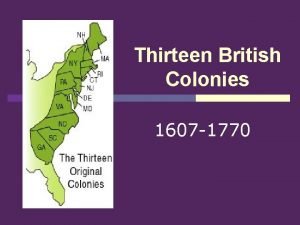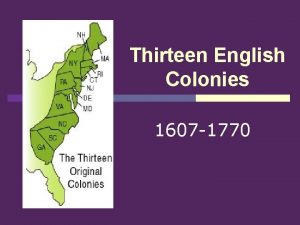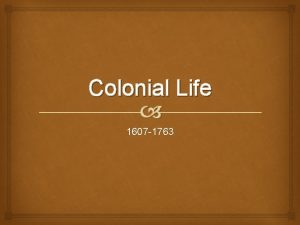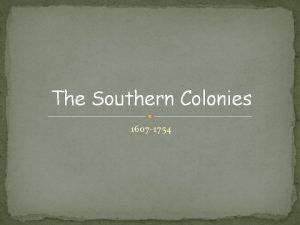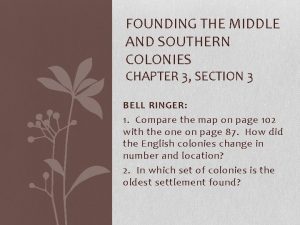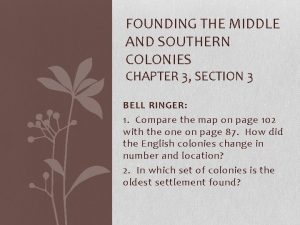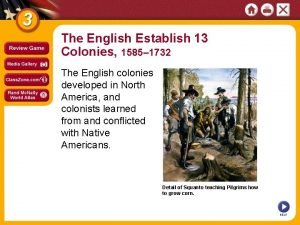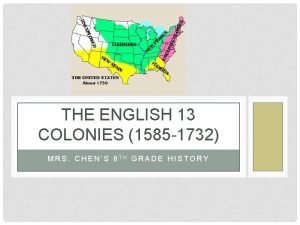Founding of the Southern Colonies 1607 1732 v



























- Slides: 27

Founding of the Southern Colonies (1607 -1732)

v Maryland v Virginia v North Carolina v South Carolina v (Carolinas were divided in 1712) v Georgia

Ethnic Origins of Colonists

How did the Southern Colonies Differ from the New England Middle Colonies? • Culture and the economy focused on agriculture. • Slave labor became essential to the Southern economy. • Towns were fewer and smaller.

The Southern Colonies averaged 89% of the slave population in Colonial America

Slave Population in Southern Colonies MIDDLE COLONIES

Virginia The Land of Cavaliers • 1 st settled at Jamestown • Williamsburg became capital in 1699 • Large tobacco Plantations were established along the James, Rappahannock, York, and Potomac rivers by individuals known as Cavaliers. • The largest and wealthiest of all the English Colonies William Byrd II

George Washington’s Mount Vernon Virginia Plantation Typical of Southern Colonies Plantations

Maryland • In 1632 King Charles I granted • Cecil Calvert-Lord Baltimore a charter (permission) to found a colony for English Catholics. It was named for the queen Henrietta Maria. • Maryland was a proprietary colony, this meant that “proprietors”, or owners controlled the government. • In the 1640’s Protestants also begin moving into Maryland. This caused tension and led to Maryland’s Assembly passing the Toleration Act of 1649 that made it a crime to restrict any form of Christian worship Lord Baltimore King Charles I

Maryland’s Flag The Calvert Family Crest

The Colony of Maryland 1632

The Colony of Carolina (Divided North and South, 1712)

Carolina’s First Settlers Came Down From Virginia for New Land to Grow Tobacco

Carolina’s First Permanent Settler • Nathaniel Batts was the first known permanent settler in what would be present North Carolina. In 1655 he built a small house along Salmon Creek at the western end of the Albemarle Sound. Batts made a tribute trading with Native Americans in the area.

Carolina “Land of Charles” • In 1663 Charles II gave land between Virginia and Spanish Florida his father Charles I had tried to settle to supporters known as the “Eight Lords Proprietors” who had helped restore his family to power following the English Civil War in the 1640’s • The Albemarle Sound settlements in the north were widely separated by those in the south such as Charleston founded in 1670. • In 1712 the colony was divided • In 1729 the King bought the Carolinas from the proprietors and North and South Carolina became “Royal Colonies”. KING CHARLES II

Carolina Charter of 1663 “Birth Certificate of the Carolinas” This Paper Told What the Proprietors Owned and What They Could Do With Carolina

Eight Lords Proprietors of Carolina Lord Ashley Anthony Cooper George Monk William Berkley Duke of Albemarle Lord Granville George Carteret

Charleston Founded in 1670 • Charleston became the center for rice and indigo production. • Indigo was used as a purple dye.

Charleston, South Carolina

Bath, North Carolina’ Oldest Town 1705 Saint Thomas Episcopal Oldest Church in NC Palmer-Marsh House

New Bern: NC’s nd 2 Oldest Town Founded by Swiss and German Protestants Under Baron Von Graffenried. Named for capital of Switzerland: Bern. New Bern became the colonial capital of North Carolina

• The Tuscarora and other Native Americans were upset with the colonists for three reasons: • They were being cheated by traders. • They resented losing their land. • Their people were being taken as slaves. Native Problems

Proprietors Divide Carolina 1712

Piracy Plagues Carolina Coast “BLACKBEARD” Edward Teach Ockacroke Island Queen Anne’s Revenge

End of Proprietorship • On July 25, 1729, the Crown and British Parliament bought North Carolina from 7 of the 8 Lords Proprietors. • Lord Granville did not sell his share. • North Carolina would be a royal colony until the Revolutionary War. John Carteret, Lord Granville: The only proprietor who did not sell his share of Carolina to the king

The Colony of Georgia 1732

Georgia In 1732 King George II granted a charter to James Oglethorpe to start a colony for “Poor English Citizens. Oglethorpe founded the city of Savannah. Oglethorpe outlawed slavery and the use of alcohol. Swiss, German, and Welsh Protestants were early settlers to Georgia. Jewish settlers moved to Savannah. The King took control of Georgia in 1752 and made slavery legal. Coastal Georgia became filled with rice plantations worked by thousands of slaves. James Oglethorpe Colonial Savannah
 1732-1607
1732-1607 1607-1732
1607-1732 Southern colonies
Southern colonies New england mid atlantic and southern colonies
New england mid atlantic and southern colonies Religion southern colonies
Religion southern colonies New england colonies definition
New england colonies definition Economy of southern colonies
Economy of southern colonies Middle colonies brochure project
Middle colonies brochure project Southern colonies geography
Southern colonies geography Caitlin driscoll
Caitlin driscoll Southern colonies society/culture
Southern colonies society/culture Southern colonies specialization
Southern colonies specialization Southern colonies religion
Southern colonies religion Middle colonies date founded
Middle colonies date founded Southern colonies
Southern colonies Southern colonies
Southern colonies Economy of southern colonies
Economy of southern colonies 13 colonies webquest
13 colonies webquest Northern middle southern colonies
Northern middle southern colonies Southern colony religion
Southern colony religion New england human characteristics
New england human characteristics Characteristics of the southern colonies
Characteristics of the southern colonies Cudgeling sport
Cudgeling sport Northern middle and southern colonies
Northern middle and southern colonies What did the middle colonies produce
What did the middle colonies produce Site:slidetodoc.com
Site:slidetodoc.com Southern colonies
Southern colonies New england confederation participants
New england confederation participants
